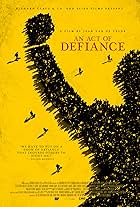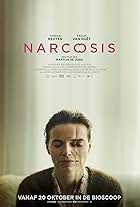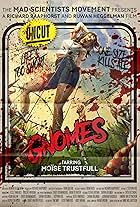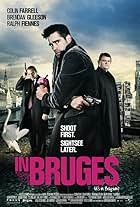IMDb RATING
5.9/10
1.2K
YOUR RATING
Child soldiers in Africa are at the fore in this tale of a white restaurant owner in an African town bordering a conflict zone. When his son's African friend Abu is abducted, he sets out to ... Read allChild soldiers in Africa are at the fore in this tale of a white restaurant owner in an African town bordering a conflict zone. When his son's African friend Abu is abducted, he sets out to find the boy, and walks right into a training camp exploiting children like Abu.Child soldiers in Africa are at the fore in this tale of a white restaurant owner in an African town bordering a conflict zone. When his son's African friend Abu is abducted, he sets out to find the boy, and walks right into a training camp exploiting children like Abu.
- Awards
- 2 wins & 3 nominations total
Photos
- Director
- Writer
- All cast & crew
- Production, box office & more at IMDbPro
Storyline
Did you know
- TriviaThe international version of this film ("The Silent Army") was the original Dutch entry for the Academy Awards' Best Foreign Film. However, the film was turned down because it was a re-cut version. This led to the submission of Winter in Wartime (2008).
- Alternate versionsA shorter (92 minutes) version that left out all the music and focused less on Marco Borsato was cut under the supervision of French critic, director and editor Pierre Rissient. This version was retitled 'The Silent Army'.
- ConnectionsFeatured in Pauw & Witteman: Episode #3.64 (2008)
Featured review
Eduard Zuiderwijk (Marco Borsato) is a cook with his own restaurant somewhere in Uganda (my guess is Kampala). After the death of his wife Anna, he is now the single father of Thomas (Siebe Schoneveld). And fatherhood isn't easy for him, as he struggles to find time to take care of his son. However Thomas copes without his father presence thanks to his best friend Abu (Sam Okelo), the housemaids son.
That is until one days the Gods Army, a rebel group in Uganda led by the ruthless Michel Obeke (Abby Mukiibi Nkaaga), raids Abu's village and takes him prisoner. Not soon after Abu is slowly but surely being converted into a child soldier. Thomas however is unable to cope with another loss and dragged down by feelings of guilt Eduard decides to embark on a rescue mission.
As in most such Western movies the inherent weakness stems from placing a European context onto an African mindset and situation. Ripe with generalisations and troubled constantly by the inherent 'good intentionality' of the story the movie is a quagmire of bad scripting, simplified interactions and self-important gibberish. Coupled with some abysmally atrocious acting the question lingers: Why did I give it such a relatively high mark? Most of this has to do with the unrelenting realism of the situation of child soldiers and the very convincing portrayal of the process of molding youth in deadly weapons. Sam Okelo, Abby Mukiibi Nkaaga and some other black actors (notably Okelo's father) make most rebel scenes exceptional, heart-wrenching, believable and tragic. Especially the young Okelo does a stand-out job and really conveys the terror of conformity, which forces unwilling children to become that which they hate. Now if this movie had dealt almost entirely with the plight of Abu it would have been a memorable achievement. However...
Each and every time a white face appears in the picture the story-writing and dialogues take a head-dive into the badlands - unfortunately for the viewers this is about 70% of screen time. None of the white actors do even a mediocre acting job, while - I hate to say this about child actors - Thomas is absolutely atrocious. The less said about Marco Borsato the better - he should definitely stay with his day job. The direction of the movie feels like a hatchet job, so - despite some memorable and strong scenes - the movie is littered by several sequences, which invoke laughter and ridicule (not a good thing in a movie with such a sombre subject matter.
Essentially the movie feels as if writer/director Jean van de Welde took some real-life situations regarding child soldiers and struggled to paste together a plot around those ideas. Hence the realism of the rebel scenes work nicely, but the rest feels forcibly flung together, is poorly written and lacks similar intensity or significance.
The decent rating I give this movie concerns solely the rebel parts. Without them I wouldn't venture to grade it higher than a 1. Very surprising that Cannes let this artistic failure anywhere near their competition - not quite a turd, but very close to being one.
That is until one days the Gods Army, a rebel group in Uganda led by the ruthless Michel Obeke (Abby Mukiibi Nkaaga), raids Abu's village and takes him prisoner. Not soon after Abu is slowly but surely being converted into a child soldier. Thomas however is unable to cope with another loss and dragged down by feelings of guilt Eduard decides to embark on a rescue mission.
As in most such Western movies the inherent weakness stems from placing a European context onto an African mindset and situation. Ripe with generalisations and troubled constantly by the inherent 'good intentionality' of the story the movie is a quagmire of bad scripting, simplified interactions and self-important gibberish. Coupled with some abysmally atrocious acting the question lingers: Why did I give it such a relatively high mark? Most of this has to do with the unrelenting realism of the situation of child soldiers and the very convincing portrayal of the process of molding youth in deadly weapons. Sam Okelo, Abby Mukiibi Nkaaga and some other black actors (notably Okelo's father) make most rebel scenes exceptional, heart-wrenching, believable and tragic. Especially the young Okelo does a stand-out job and really conveys the terror of conformity, which forces unwilling children to become that which they hate. Now if this movie had dealt almost entirely with the plight of Abu it would have been a memorable achievement. However...
Each and every time a white face appears in the picture the story-writing and dialogues take a head-dive into the badlands - unfortunately for the viewers this is about 70% of screen time. None of the white actors do even a mediocre acting job, while - I hate to say this about child actors - Thomas is absolutely atrocious. The less said about Marco Borsato the better - he should definitely stay with his day job. The direction of the movie feels like a hatchet job, so - despite some memorable and strong scenes - the movie is littered by several sequences, which invoke laughter and ridicule (not a good thing in a movie with such a sombre subject matter.
Essentially the movie feels as if writer/director Jean van de Welde took some real-life situations regarding child soldiers and struggled to paste together a plot around those ideas. Hence the realism of the rebel scenes work nicely, but the rest feels forcibly flung together, is poorly written and lacks similar intensity or significance.
The decent rating I give this movie concerns solely the rebel parts. Without them I wouldn't venture to grade it higher than a 1. Very surprising that Cannes let this artistic failure anywhere near their competition - not quite a turd, but very close to being one.
Details
- Release date
- Country of origin
- Official site
- Languages
- Also known as
- Vahşetin Çocukları
- Filming locations
- Production companies
- See more company credits at IMDbPro
Box office
- Gross worldwide
- $2,920,058
- Runtime1 hour 55 minutes
- Color
- Sound mix
- Aspect ratio
- 2.39 : 1
Contribute to this page
Suggest an edit or add missing content















